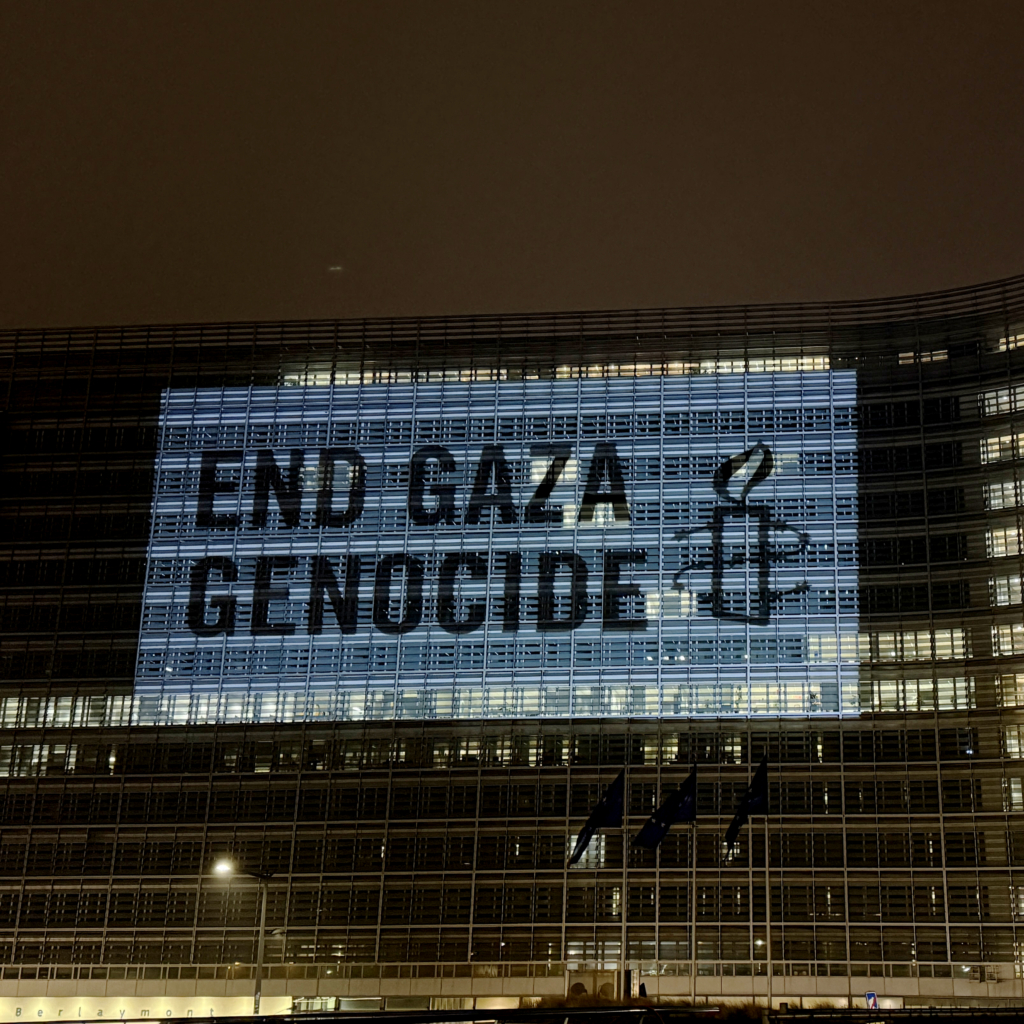Ursula von der Leyen knows that the EU’s reputation as a reliable actor in human rights and international law is at stake because of the terror in Gaza.
EU leaders and officials have gone from privately denouncing the bloc’s double standards to publicly lamenting it. However, rather than address these double standards, the European Commission president rebranded them as the “anti-EU narrative” and tasked the new Mediterranean Commissioner and foreign policy chief with developing a communications strategy to highlight the EU’s contribution to the region. But there are some issues that even the savviest communication strategies can’t hide.
Following the atrocities committed by Hamas and other armed groups on October 7, 2023, Israeli military operations have killed more than 45,000 Palestinians, 60% of whom were children, women and the elderly. The Israeli offensive has turned the occupied Gaza Strip into a wasteland, causing shocking and unprecedented levels of death, suffering and destruction. Amnesty International investigates Israel’s offensive in Gaza, examining the pattern of illegal conduct, the harmful and damaging impact of its policies and actions, and the racism, dehumanization and racial abuse of Israeli government and military officials Extinction speech.
The conclusion is clear: Israel carried out these actions with the aim of exterminating the Palestinians in Gaza. Israel is committing genocide. We also found that not only was the genocide in Gaza the most documented in history, but the EU and many of its member states failed to stop it. Furthermore, some member states continue to transfer weapons to Israel, thereby risking becoming complicit in Israel’s genocide.
“All signs of genocide flash red”
Amnesty International report ‘“You feel like a subhuman being”: Israel’s genocide of Palestinians in Gaza The book is the culmination of nine months of meticulous research and totals 296 pages. During the course of the investigation, we interviewed 212 people, conducted extensive fieldwork and analyzed extensive visual and digital evidence, including satellite imagery. Crucially, we also analyze the evidence of Israeli intent before concluding that Israel has committed and is continuing to commit genocide in Gaza.
We found that in 15 air strikes, Israel directly attacked civilians without effective warning, killing 334 civilians, including 141 children, and injuring hundreds more. These airstrikes are part of a wider pattern of deliberately indiscriminate attacks. We have also documented how Israel deliberately imposes living conditions on Palestinians in Gaza with the intent of causing their physical destruction. In the context of Israel’s long history of apartheid and illegal occupation, the inescapable conclusion is that Israel’s purpose in carrying out these actions is to eliminate the Palestinians in Gaza.
Not surprisingly, the world has been reluctant to acknowledge that the situation in Gaza is a genocide. After all, if what we were witnessing every day for 14 months was indeed genocide, what would the international community say?
The International Court of Justice (ICJ) recognized the risk of genocide against Palestinians in Gaza and ordered a number of binding measures to prevent this. The International Criminal Court (ICC) further issued arrest warrants for the Israeli prime minister and former defense minister for war crimes and crimes against humanity.
As ICJ Judge Abdulqawi Yusuf said: “All signs of genocide flash red.”
Not everyone agrees with our findings. However, many countries have already reached the same conclusion before us. While others may refuse to acknowledge the reality, the EU and its member states face two main responsibilities under international law: the obligation not to assist or facilitate genocide and the obligation to prevent genocide.
In the absence of unity, EU member states must go it alone
As European leaders gather in Brussels for the European Council, new HR/VP Kaja Karas faces the daunting challenge of convincing all 27 member states to abide by these two fundamental obligations under international law.
However, in the absence of joint action at EU level, it is the responsibility of individual Member States to act on their own to fulfill their obligations to prevent genocide and to avoid becoming complicit in it. Specifically, this requires five specific actions.
The remaining EU member states that continue to export or allow the transfer of arms to Israel must follow the example of those countries that have correctly suspended the export and transfer of arms to Israel.
Countries must exert diplomatic pressure on Israel, including publicly acknowledging that Israel has committed war crimes, crimes against humanity, genocide and other violations of international law.
States must support judicial mechanisms, including by protecting the ICC from reprisals, supporting the Court financially and politically, and publicly committing to the execution of arrest warrants issued by the ICC. In addition, States have a duty to investigate and prosecute international crimes committed in Gaza under universal jurisdiction, or where alleged perpetrators or victims have dual nationality.
For its part, the EU must not allow Israel to destroy the United Nations Relief and Works Agency for Palestine Refugees (UNRWA), which remains the only lifeline for millions of Palestinians. This requires financial and political support for UNRWA and support for Norway in challenging Israeli attempts to dismantle the agency at the United Nations General Assembly.
Finally, whatever EU leaders talk about “the day after tomorrow” and the prospects for long-term peace will remain empty words as long as Israeli settlement expansion, illegal occupation and apartheid persist. The EU must first fulfill its legal obligations spelled out by the International Court of Justice and prohibit trade and investment that help sustain Israel’s illegal occupation.
In the pages of history, two types of politicians will be remembered: those who remained silent in the face of the Gaza genocide and those who stood up to stop it.
*This article was originally published on EUobserver on December 19.


